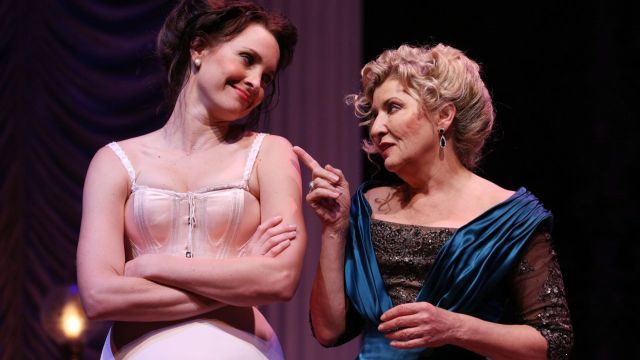Boston Marriage
David Mamet’s plays are normally full of foul-language, testosterone-macho braggards, and sizzling word-play. To appease his critics Mamet did a complete switch and wrote Boston Marriage to prove he could write for women.
The play is set in Victorian-era America in 1905. The phrase Boston Marriage at the time was a euphemism for lesbianism. Anna is the paramour of a wealthy man. Claire is her younger lover. When Claire announces she has fallen in love with a younger woman and has invited her to Anna’s house for an assignation, Anna only goes along with it if she can participate as a voyeur.
It’s a meaty plot, but it’s definitely second-tier Mamet. The amount of intellectual energy expounded to negotiate the intense and dense text is ultimately not rewarded. The play just does not engage. Amanda Muggleton’s tour-de-force performance as Anna almost makes up for the play’s inadequacies. She pouts, she preens, she postulates, and delivers each line of dialogue as thought it were a rapier of Wildean wit, which it definitely is not.

Rachel Gordon as Claire prances like a panther on heat and answers Anna’s interminable ripostes with ferociously carnal intent. Together they are formidable.
The other character in this female menagerie is Catherine, the Scottish maid (who Anna believes is Irish), and who is straight out of a West End farce of the 1950s. In the role Helen Cassidy is funny and never misses a laugh, but the character and the performance belong in another play.
Some of the dialogue is anachronistic (“tell it to the marines”) and music-hall bawdy (“We’ve fallen victim to the worst sin.” “Farting in church?”), but the anachronisms received the biggest laughs so maybe there should have been more of them.
Stephen Curtis’ set, with its Corinthian columns and ruffled curtains, looks grand but lacks the intimacy of a drawing room, while Phil Hagstrom’s music choice was way too contemporary. Rather than charm it jarred.
Andrea Moor’s direction is pacey. I became almost giddy with the number of times the principals chased each other around the chaise-longue but it did keep the play moving. In summary: minor Mamet, major performances!
Peter Pinne
Subscribe to our E-Newsletter, buy our latest print edition or find a Performing Arts book at Book Nook.

